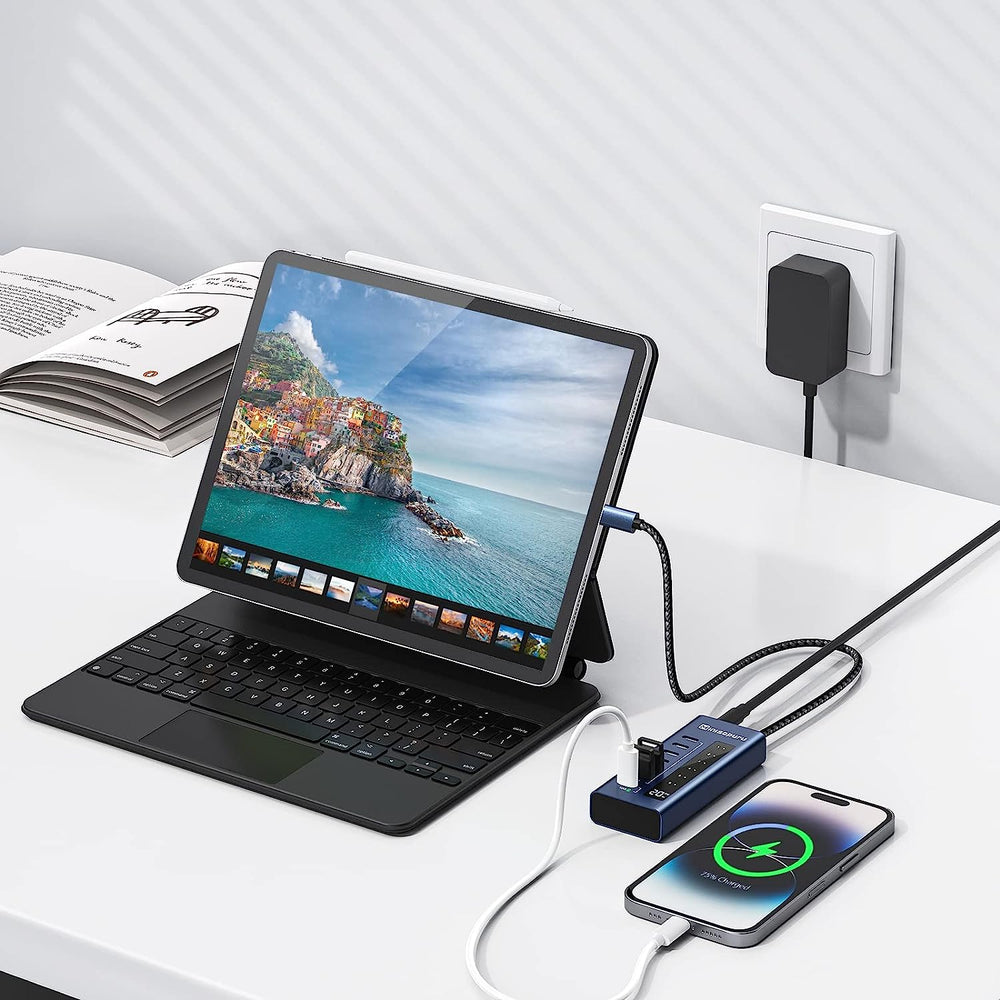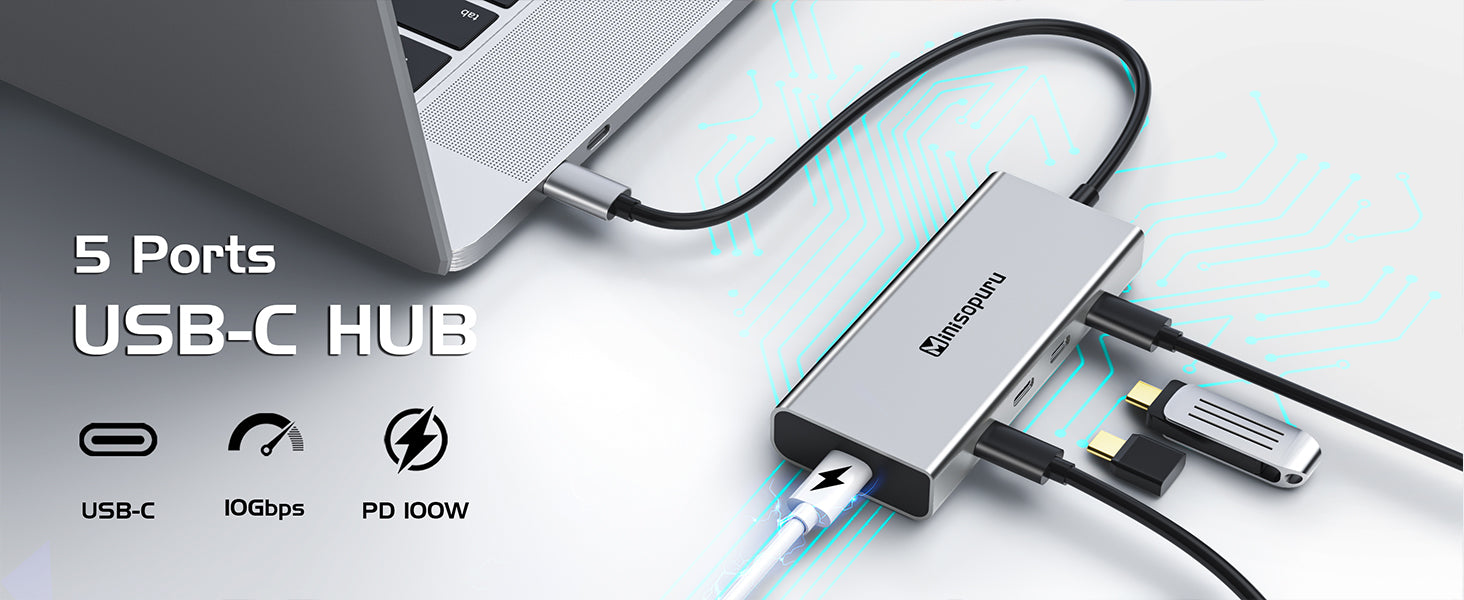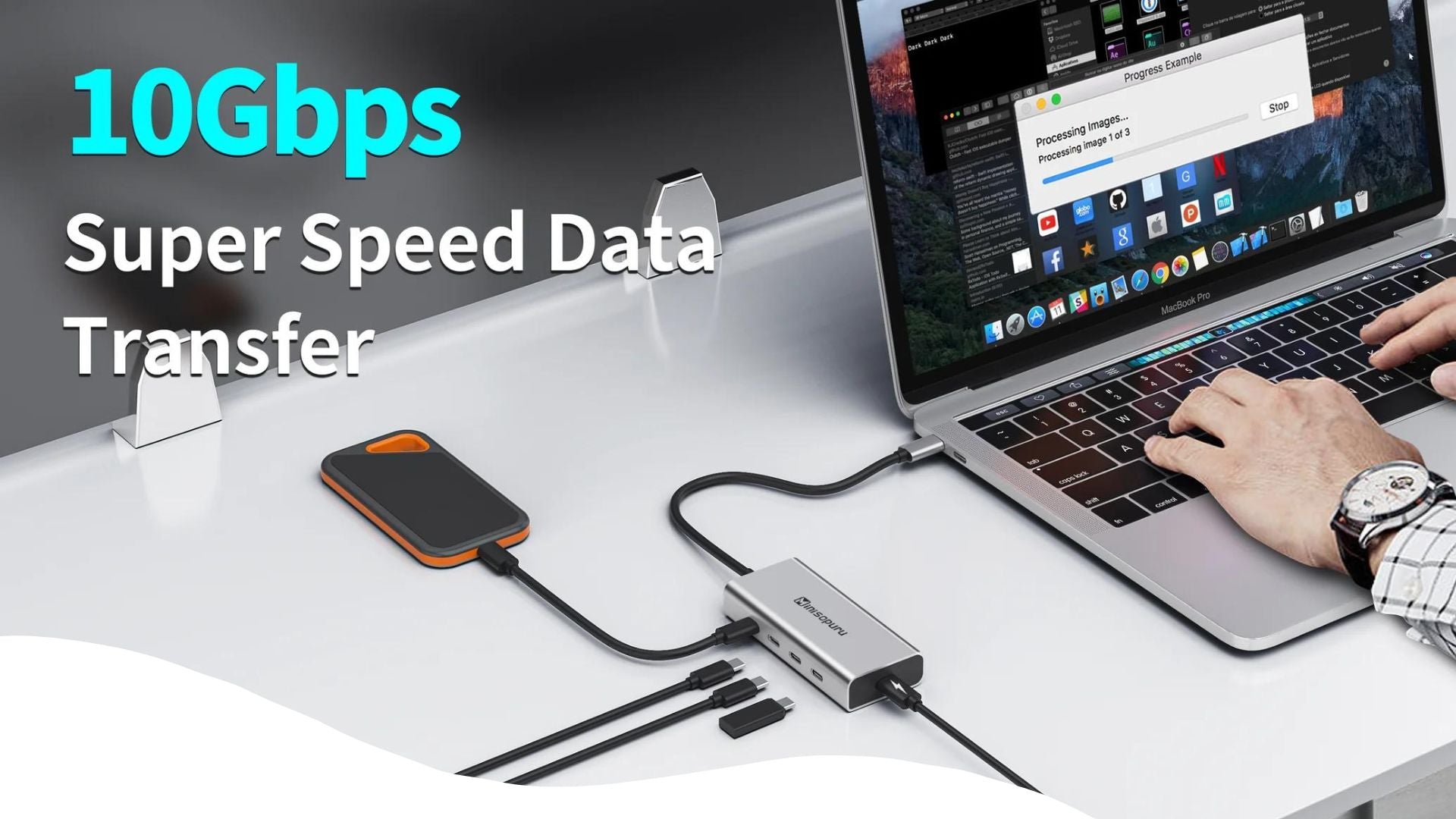In today's world, laptops have ended up as a basic tool for work, education, and entertainment. However, they frequently need the ports and network alternatives that are fundamental for a seamless and beneficial experience. This is where a laptop docking station comes in.
A docking station is a device that permits you to grow your laptop's capabilities by giving extra ports for peripherals such as external monitors, mice, keyboards, and other devices. But with so many options accessible in the market, choosing the right laptop docking station can be difficult. In this comprehensive guide, we'll walk you through everything you would like to know to create an informed decision and discover the perfect docking station for your needs.
From compatibility and network to port types and power necessities, we've got you covered. So, let's jump in and find the exact direction for choosing the correct laptop docking station.
What is a Laptop Docking Station?
Laptop docking stations are designed to bridge the gap between mobility and having a permanent spot to work and play. You may have the best of both worlds with a docking station, which allows your laptop to serve dual roles.
Docking stations typically connect to a laptop through a single cable, which makes it simple to connect and disconnect the laptop from the docking station without having to unplug and plug in different cables. With a laptop docking station, users can upgrade their efficiency, move forward in their workflow, and have a more consistent computing experience.
What kinds of Laptop Docking Stations are there?
There are four fundamental types of laptop docking stations, those types are listed below:
USB Docking Stations:
USB docking stations are the foremost common type of docking station and connect to a laptop through a USB port. They offer a number of network alternatives such as HDMI or VGA ports for external monitors, USB ports for peripherals, and Ethernet ports for network connectivity.
Thunderbolt Docking Stations:
Thunderbolt docking stations use a Thunderbolt port to put through to a laptop and offer quick information exchange speeds and more network alternatives than USB docking stations. They typically offer higher resolutions for external displays, quicker information exchange speeds, and support for numerous displays.
Proprietary Docking Stations:
Proprietary docking stations are planned particularly for certain laptop models and connect to a restrictive port on the laptop. They give multiple network choices and may incorporate highlights such as charging capabilities.
External GPU Enclosures:
External GPU enclosures are docking stations that are designed specifically to move forward a laptop's design execution. They permit users to put through a desktop-class graphic card on their laptop, which can essentially move forward gaming and graphics-intensive tasks.
Do You Need A Laptop Docking Station?
Whether you wish for a laptop docking station or not depends on your particular needs and utilization case. Here are a few scenarios where a laptop docking station may be beneficial:
Multiple external displays: If you require numerous external displays to increase your efficiency, a laptop docking station can give the important ports and network alternatives to associate those displays.
Additional ports: If your laptop has constrained ports, a docking station can give extra USB ports, Ethernet ports, sound ports, and more.
Improved workflow: A docking station can make it simpler to switch between distinctive peripherals such as a mouse, keyboard, and external hard drive, permitting a more proficient workflow.
Ergonomic benefits: A docking station can also provide ergonomic benefits by permitting you to put through your laptop to an external display, mouse, and keyboard, which can offer help in decreasing strain on your neck and shoulders.
Basically, if you believe your laptop lacks sufficient ports, want to connect to an external monitor, transfer files at high speeds, or simply wish you had more freedom to get more done with your laptop, you will most likely require a USB-C hub or docking station.
What to Consider Before Buying a Laptop Docking Station?
With the expanding popularity of laptops in both proficient and individual use, laptop docking stations have become essential tools to improve efficiency and streamline workflows. However, with so many choices accessible on the market, choosing the perfect laptop docking station can be hard. To form an educated choice, there are a few things you would like to consider before buying a laptop docking station.
1. Good Video Output for Your Needs
When choosing a laptop docking station, video output options are a basic thought. The correct video output choices can make a critical contrast in your computing encounter, especially when you work with different external displays or require high-resolution and high-refresh-rate displays.
Firstly, consider the number of external displays you would like to put through to the docking station. Numerous docking stations offer support for double or triple displays, permitting you to put through numerous external screens for improvement in productivity.
Secondly, make sure that the docking station underpins the fundamental video output alternatives for your displays, such as HDMI, DisplayPort, or VGA. Guarantee that the docking station supports the resolutions and refresh rates required by your displays for ideal performance.
If you require high-resolution displays for assignments such as graphic design, video altering, or gaming, ensure that the docking station can handle the essential determination and refresh rates. A few docking stations offer 4K and up to 8K resolution support, giving an immersive visual experience.
2. Good Power Delivery
Another vital calculation to consider when choosing a laptop docking station is power delivery. A docking station with great power delivery guarantees that your laptop gets adequate control to work at its greatest execution whereas at the same time charging the battery.
When selecting a docking station, check the wattage of the power supply and make sure that it can give sufficient power to charge your laptop at its most extreme rate. A few docking stations offer up to 100 watts of power delivery, permitting you to charge even the most power-hungry laptops.
Moreover, in case you use a laptop that requires a proprietary charger, check if the docking station supports the same type of charger. This will guarantee that you do not need to carry different chargers with you and can keep your workspace clutter-free.
Good power conveyance is especially vital when you use your laptop for resource-intensive tasks such as gaming, video altering, or 3D modeling. A docking station that can give adequate power conveyance guarantees that your laptop works at its ideal performance and you do not have to be stressed about running out of battery amid basic tasks.
3. Ethernet Support
Ethernet support is another basic thing to consider when choosing a laptop docking station. In case you require a stable and quick internet for assignments such as video conferencing, streaming, or downloading huge records, an Ethernet port on your docking station can give a reliable connection that's quicker and steady than Wi-Fi.
When selecting a docking station, make sure that it contains a gigabit Ethernet port that can handle high-speed internet. A few docking stations also offer extra highlights such as Wake-on-LAN and VLAN support, which can advance and improve your connectivity and security.
Moreover, if you work in an office environment with limited Wi-Fi systems or require a wired connection for particular work, an Ethernet port on your docking station can offer a dependable connection without requiring extra connectors or cables.
4. The Correct Ports for Your Needs
Choosing a laptop docking station that provides the right ports for your particular needs is vital for enhancing efficiency and streamlining workflows. Different docking stations offer diverse port alternatives, and selecting the correct ports can guarantee that you just can connect all your peripherals and extras to the docking station without any compatibility issues.
Some basic ports to consider when selecting a docking station incorporate USB ports, sound ports, and card readers. The number of USB ports on a docking station can change, with a few advertising up to 10 USB ports for connecting different devices, like printers, external hard drives, and keyboards.
Audio ports, like earphone jacks, and mouthpiece inputs, are fundamental for assignments such as video conferencing, podcasting, or music generation. A docking station that provides high-quality sound output and input can essentially move forward your sound encounter and make your work more efficient.
Additionally, if you frequently use memory cards for your work such as exchanging information or bringing in media, a docking station with a built-in card reader can be a helpful highlight. Numerous docking stations offer card readers that support different sorts of memory cards, including SD, microSD, and CompactFlash.
5. Card Reader Functionality
Card reader functionality is another important thing to consider when selecting a laptop docking station, especially if you work with memory cards frequently.
Many experts, like photographers, videographers, and graphic originators, use memory cards to transfer files and information from cameras, and other gadgets. A docking station with a built-in card readers can streamline this preparation and dispose of the requirement for extra adapters or cables.




